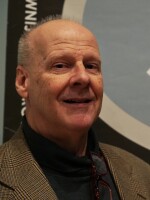The NIU School of Theatre & Dance calls its latest production “a bit of musical theatre insanity.”
“The Persecution and Assassination of Jean-Paul Marat as Performed by the Inmates of the Asylum of Charenton Under the Direction of the Marquis de Sade,” or, as it’s usually known, ‘Marat/Sade,’ is directed by NIU professor Stanton Davis. Davis says he wanted emphasize the timeless nature of the play’s message.
"We’ve set it in a non-specific time and place, because I think the playwright, Peter Weiss, was writing more about his time than the French Revolution. He was looking at this sort of argument between absolutism on two sides: absolutism of the totalitarian collectivist state and absolutism of a kind of libertarian utopia where every man’s for themselves."
Davis says , while there is music that was written for an influential English stage production and a film, there's actually not set score, and that’s given NIU an opportunity to do something new.
And that’s really exciting. Our composer Anthony Perella, is a member of the faculty in the NIU Theatre Department. And he’s composed music using samples of Hector Berlioz’ operas and symphonies and so on, using special effects and rhythm tracks so it has a much more contemporary feel in a lot of ways to it.
Davis says that's not the only thing different about this production. He's also changed the setting to a women's prison.
And so all the main characters – Marat, the Marquis de Sade, the Herald, the male singers – are all played by the women of the prison, and then the nurses and guards pick up the other roles. So Charlotte Corday is played by a man, Duperett her lover is played by a woman, the Marquis de Sade is played by a woman, the Marquis’ Herald is played by a man, etc., etc. And what that does again is give you a little bit of distance from the material.
So with all these updates, will the audience have have that moment of moment of identification - of recognition? Davis hopes so.
I’ve tried to have moments where there’s recognizable comedy, that there’s recognizable music that you can sort of wrap your brain around, but at the same time highlight those debates, which seem to be universal, which are about how much freedom do we deserve as a society, do we need in order to function, and how much leadership do we need, and how much government we need, and how much free enterprise we need, and balancing all those things. So I think in a way, when people hear those lines they’re going to resonate, basically because they’re framed around all this other stuff, so that you get a moment to catch your breath from the songs, and then all of the sudden you get a truism that can leave you quite stunned. I mean, the script, I think, is absolutely beautiful.
So there are layers - layers upon layers. And with all those layers, and that argument, is there an answer, or are there just questions? Davis says yes to both.
Well, I do think, that, at its core, it’s a polemic. I think that Peter Weiss writes a very, very articulate indictment of his own political beliefs. I think Weis was, if anything, a collectivist, not a communist per se, but certainly like, in German terms, a Social Democrat. And he sort of believed in the ability of government to solve the problems of things like health care and poverty and things like that. But the most articulate character is the Marquis de Sade who’s a huge advocate for absolute individual freedom. I think he actually writes a character that critiques his own political beliefs, and in doing so, I think what he says is, that there should be no extremes. When the extremes take hold in a society, they basically ruin any possibility for compromise, for working together, for anything other than polarization. Which is interesting because I think, right now, we’re in the middle of a very polarized time in this country, and this play is sort of an indictment of what happens when that polarization becomes extreme.
"Marat/Sade" runs through November 1 at Huntley Middle School in DeKalb.


